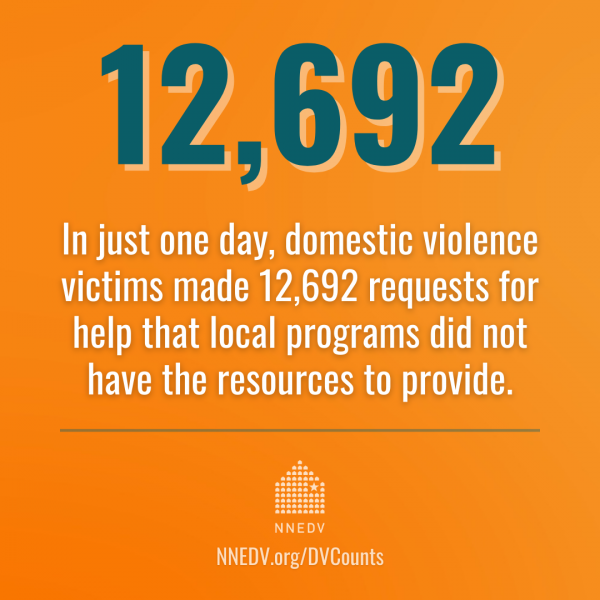
The National Network to End Domestic Violence (NNEDV) recently completed its 17th annual Domestic Violence Counts Survey - a one-day, unduplicated count of adults and children seeking domestic violence services in the United States on September 7, 2022. The survey revealed the staggering impact of domestic violence on our communities and the signficant level of unmet need, especially for survivors from historically marginalized communities.
Nationally, 79,335 victims and survivors of domestic violence were supported on that day alone.
- 44,882 adult and child victims found refuge in emergency shelters, transitional housing, hotels, motels, or other housing provided by local domestic violence programs
- 34,453 adult and child victims received nno-residential support related to legal needs, housing advocacy, transportation, mental health, and more
- An additional 22,332 hotline contacts were received - an average of more than 16 contacts every minute
- 12,692 additional requests for support were unable to be met do to a lack of resources, 53% of which were for housing
In Massachusetts, 1,868 victims and survivors of domestic violence were supported on that day alone.
- 756 adult and child victims found refuge in emergency shelters, transitional housing, hotels, motels, or other housing provided by local domestic violence programs
- 1,112 adult and child victims received nno-residential support related to legal needs, housing advocacy, transportation, mental health, and more
- An additional 393 hotline contacts were received - an average of more than 16 contacts every hour
- 452 additional requests for support were unable to be met do to a lack of resources, 54% of which were for housing
- Unmet requests increased 40% from the previous survey year
The study also emphasized a need to understand and address the barriers faced by survivors of color, members of the LGBTQ+ community, immigrant survivors, disabled survivors, and other survivors from historicallly marginalized communities. At HarborCOV, we specialize in removing barriers and creating access to a range of support for these survivors.
Domestic violence programs like HarborCOV depend on local, state, and federal government grants, along with private donations and support, to support survivors. Increased funding is needed to limit the number of unmet requests for support locally and nationally.
Want to help?
- Contact your legislators to advocate for increased funding to support survivors
- Volunteer at a local domestic violence program
- Give to a local organization supporting survivors


